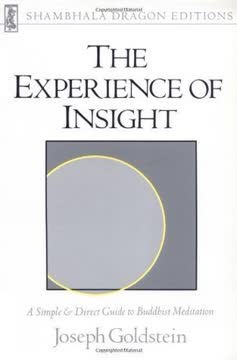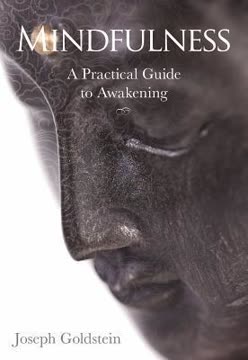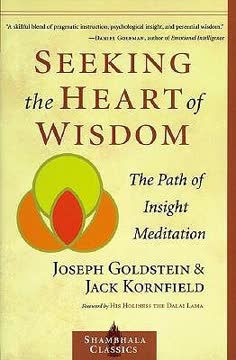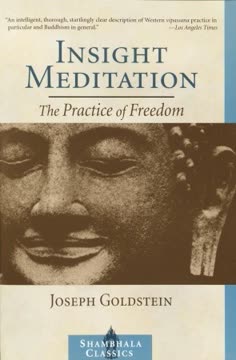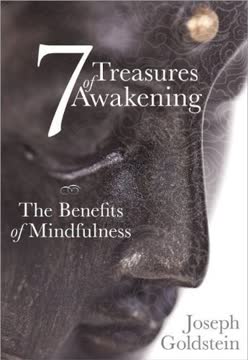Key Takeaways
1. Understanding Suffering is the First Step to Liberation
"Every being is going to experience the results of his wholesome and unwholesome deeds."
The Nature of Suffering. The Buddha's first noble truth acknowledges that suffering is an inherent part of human existence. This suffering encompasses physical pain, emotional distress, and the fundamental unsatisfactoriness of life. By recognizing suffering, we can begin to understand its root causes and seek liberation.
Types of Suffering:
- Physical pain and illness
- Emotional distress like anxiety and depression
- The impermanence of pleasant experiences
- The inevitability of aging and death
Transformative Perspective. Understanding suffering is not about wallowing in misery, but about developing a clear-eyed view of human experience. This awareness creates the motivation to seek a deeper understanding of our mental processes and ultimately find a path to peace.
2. The Mind is a Continuously Changing Process
"In what is seen, there must be just the seen; in what is heard, there must be just the heard."
Impermanence of Experience. The mind is not a fixed entity but a constantly flowing process of arising and passing mental states. Each moment of consciousness is unique, creating and dissolving experiences instantaneously. This understanding challenges our notion of a permanent, unchanging self.
Characteristics of Mind:
- Moment-to-moment transformation
- No permanent essence or identity
- Influenced by mental factors like perception, feeling, and consciousness
- Conditioned by past experiences and current circumstances
Liberation through Observation. By observing the mind's fluidity, we can detach from the illusion of a solid self and experience greater freedom from mental conditioning.
3. Mindfulness is the Path to Freedom
"Be lamps unto yourselves. Be refuges to yourselves."
Awareness as Transformation. Mindfulness is the practice of moment-to-moment awareness without judgment. It involves observing thoughts, sensations, and experiences as they arise, creating a space of non-reactive consciousness that can lead to profound insights.
Mindfulness Practices:
- Breath awareness
- Body scanning
- Observing thoughts without attachment
- Walking meditation
- Eating meditation
Cultivating Inner Peace. Through consistent mindfulness practice, we develop the ability to respond to life's challenges with clarity, compassion, and equanimity, rather than being driven by habitual reactions.
4. Karma Shapes Our Experiences
"All beings are the heirs of their own past karma."
The Law of Cause and Effect. Karma is not a punishment system but a natural law of cause and effect. Our current experiences are shaped by past actions, and our present actions create future conditions. This understanding empowers us to take responsibility for our lives.
Karmic Influences:
- Reproductive karma (determining rebirth)
- Supportive karma (creating pleasant experiences)
- Counter-active karma (mitigating negative conditions)
- Destructive karma (interrupting existing karmic patterns)
Mindful Action. By understanding karma, we can consciously choose actions that create positive conditions and gradually transform our mental and external environments.
5. Cultivate Generosity and Moral Restraint
"If we knew the fruit of giving, we would not let a single meal pass without sharing."
Ethical Foundation. Generosity and moral restraint are crucial for spiritual development. By practicing non-greed, non-harm, and truthfulness, we create the conditions for inner peace and spiritual growth.
Ethical Practices:
- Giving without expectation
- Following basic moral precepts
- Practicing non-violence
- Speaking truthfully
- Avoiding intoxicants
Purification of Mind. These practices help release mental defilements and create a foundation for deeper meditation and insight.
6. Develop Concentration and Insight
"Wisdom does not come from any particular object, any particular state."
Meditative Development. Concentration and insight meditation work together to develop a clear, penetrating understanding of reality. Concentration stabilizes the mind, while insight reveals the true nature of experience.
Meditation Techniques:
- One-pointed concentration
- Breath awareness
- Observing mental states
- Investigating the nature of phenomena
- Developing equanimity
Transformative Understanding. Through sustained practice, we develop the ability to see reality beyond conceptual thinking, experiencing a profound sense of liberation.
7. Practice Lovingkindness and Compassion
"When there is no self, there is no other. That duality is created by the idea of self."
Universal Love. Lovingkindness meditation cultivates a boundless, unconditional love that extends to all beings. It dissolves the barriers of self and other, creating a profound sense of interconnectedness.
Compassion Practices:
- Sending loving thoughts to self and others
- Cultivating empathy
- Practicing forgiveness
- Recognizing shared human experience
- Offering support without attachment
Emotional Liberation. By developing lovingkindness, we free ourselves from the narrow confines of self-centeredness and experience a more expansive, peaceful state of being.
8. Break Free from Conceptual Thinking
"Do not seek the truth. Only cease to cherish opinions."
Beyond Concepts. Our attachment to ideas and beliefs creates suffering. By learning to experience reality directly, without the filter of conceptual thinking, we can perceive life more openly and freely.
Letting Go of Concepts:
- Recognizing the limitations of mental constructs
- Experiencing phenomena directly
- Suspending judgment
- Staying present
- Embracing uncertainty
Direct Experience. Breaking free from conceptual thinking allows for a more immediate, vivid engagement with life.
9. The Seven Factors of Enlightenment
"When all these different factors of mind are cultivated and brought to maturity, the mind becomes liberated."
Holistic Mental Development. The seven factors of enlightenment represent a comprehensive approach to mental cultivation, balancing arousing and tranquilizing qualities.
Enlightenment Factors:
- Mindfulness
- Investigation
- Energy
- Rapture
- Calm
- Concentration
- Equanimity
Integrated Practice. By developing these qualities, we create the conditions for profound insight and liberation.
10. Death is a Teacher of Wisdom
"Death is not for some while sparing others."
Impermanence and Awareness. Contemplating death helps us live more fully and authentically. By recognizing life's transient nature, we can let go of attachments and live with greater clarity and purpose.
Death Awareness Practices:
- Reflecting on mortality
- Letting go of unnecessary attachments
- Living with intention
- Embracing each moment
- Cultivating acceptance
Transformative Perspective. Understanding death as a natural process can liberate us from fear and help us appreciate the preciousness of life.
Last updated:
FAQ
What is "The Experience of Insight" by Joseph Goldstein about?
- Practical Guide to Meditation: The book is a direct, practical guide to Buddhist meditation, specifically focusing on Vipassana (insight) meditation as taught in intensive retreats.
- Transcribed Retreat Talks: It presents a series of talks and instructions given during a month-long silent meditation retreat, offering both theory and step-by-step practice advice.
- Integration of Dharma: Goldstein explores how to integrate the teachings of the Buddha (Dharma) into daily life, emphasizing mindfulness, awareness, and the path to liberation.
- Accessible for Westerners: The book is tailored for Western readers, demystifying Buddhist concepts and making them accessible without requiring prior experience or belief.
Why should I read "The Experience of Insight" by Joseph Goldstein?
- Clear Meditation Instructions: The book provides clear, detailed instructions for both beginners and experienced meditators on how to practice mindfulness and insight meditation.
- Addresses Common Challenges: Goldstein addresses common obstacles and questions that arise during meditation, offering practical solutions and encouragement.
- Universal Wisdom: The teachings are rooted in ancient Buddhist wisdom but are presented in a way that is relevant to modern life and personal growth.
- Transformative Potential: Readers are guided toward greater self-understanding, emotional balance, and the possibility of genuine freedom from suffering.
What are the key takeaways from "The Experience of Insight" by Joseph Goldstein?
- Mindfulness is Foundational: Mindfulness (bare attention) is the core practice that leads to insight, clarity, and liberation.
- Impermanence and Non-Self: Deep understanding of impermanence, suffering, and the absence of a permanent self are central to Buddhist insight.
- Practical Application: The Dharma is not just theory; it must be lived and practiced in every moment, both on and off the meditation cushion.
- Balance and Patience: Progress on the path requires patience, balance, and a gentle, persistent effort rather than striving or force.
How does Joseph Goldstein define and teach Vipassana (Insight) Meditation in "The Experience of Insight"?
- Moment-to-Moment Awareness: Vipassana is the cultivation of continuous, non-judgmental awareness of whatever arises—breath, sensations, thoughts, feelings.
- Noting and Labeling: Goldstein recommends mentally noting experiences (e.g., "thinking," "pain," "hearing") to maintain mindfulness and prevent identification.
- Experiential, Not Conceptual: The emphasis is on direct experience rather than intellectual analysis or visualization.
- Integration with Daily Life: The practice extends beyond formal sitting to walking, eating, and all daily activities, fostering a seamless mindfulness.
What is the Noble Eightfold Path according to "The Experience of Insight" by Joseph Goldstein?
- Eight Interconnected Steps: The path includes Right Understanding, Right Thought, Right Speech, Right Action, Right Livelihood, Right Effort, Right Mindfulness, and Right Concentration.
- Ethical Foundation: The first steps focus on ethical conduct—speech, action, and livelihood—to create a supportive environment for meditation.
- Mental Development: The latter steps emphasize mental training through effort, mindfulness, and concentration, leading to wisdom.
- Practical Map: Goldstein presents the path as a practical, step-by-step guide for spiritual development and freedom.
How does "The Experience of Insight" by Joseph Goldstein address common obstacles and hindrances in meditation?
- Five Hindrances Identified: The main obstacles are sense desire, ill will, sloth and torpor, restlessness, and doubt.
- Recognition as Key: Mindfully recognizing these hindrances as they arise is the most effective way to weaken their power.
- Practical Antidotes: Goldstein offers specific antidotes for each hindrance, such as generating lovingkindness for anger or investigating sleepiness with curiosity.
- Non-Identification: Emphasizes not identifying with hindrances; they are impersonal mental factors, not "self."
What is "bare attention" and why is it important in "The Experience of Insight" by Joseph Goldstein?
- Definition: Bare attention is observing things as they are, without judgment, comparison, or interference—simply noticing the present moment.
- Foundation of Insight: It is the essential quality that allows for the direct experience of reality, leading to wisdom and freedom.
- Cultivated Through Practice: Bare attention is developed through repeated, gentle effort in meditation and daily life.
- Effortless Awareness: With practice, it becomes a natural, effortless way of being, not limited to formal meditation.
How does "The Experience of Insight" by Joseph Goldstein explain the concepts of impermanence, non-self, and suffering?
- Impermanence (Anicca): All phenomena—thoughts, sensations, experiences—are in constant flux, arising and passing away moment to moment.
- Non-Self (Anatta): There is no permanent, unchanging self; what we call "I" is a process of changing elements and mental factors.
- Suffering (Dukkha): Suffering arises from clinging, aversion, and ignorance of the true nature of reality.
- Direct Experience: Insight into these truths comes not from belief, but from direct, mindful observation in meditation.
What are the Four Noble Truths as presented in "The Experience of Insight" by Joseph Goldstein?
- Truth of Suffering: Suffering is inherent in life—birth, aging, illness, death, and the dissatisfaction of unfulfilled desires.
- Truth of the Cause: The cause of suffering is craving, attachment, and ignorance.
- Truth of the End: Suffering can be ended by letting go of craving and attachment.
- Truth of the Path: The Noble Eightfold Path is the way to the end of suffering, through ethical living, mental discipline, and wisdom.
How does "The Experience of Insight" by Joseph Goldstein integrate Buddhist concepts like karma, dependent origination, and lovingkindness?
- Karma: Actions motivated by greed, hatred, or delusion lead to suffering; actions rooted in generosity, love, and wisdom lead to happiness.
- Dependent Origination: Explains the chain of causes and conditions that perpetuate suffering and rebirth, and how mindfulness can break the cycle.
- Lovingkindness (Metta): Lovingkindness meditation is taught as a complementary practice to insight, cultivating unconditional goodwill toward oneself and others.
- Practical Application: These concepts are not just philosophical—they are tools for understanding and transforming one's life.
What are the Seven Factors of Enlightenment according to "The Experience of Insight" by Joseph Goldstein?
- Mindfulness: Continuous, non-judgmental awareness of the present moment.
- Investigation of Dharma: Curious, experiential inquiry into the nature of mind and phenomena.
- Energy/Effort: Sustained, balanced effort in practice.
- Rapture (Joy): Zestful interest and delight in the practice and the Dharma.
- Calm (Tranquility): Deep peace and stillness of mind.
- Concentration: One-pointedness and stability of attention.
- Equanimity: Even-mindedness and impartiality toward all experiences.
What are the best quotes from "The Experience of Insight" by Joseph Goldstein and what do they mean?
- "Be lamps unto yourselves. Be refuges to yourselves. Take yourselves to no external refuge." — Encourages self-reliance and direct experience rather than dependence on external authorities.
- "There’s nothing to be, nothing to do, and nothing to have." — Points to the freedom found in letting go of striving and self-image, embodying the spirit of the Tao.
- "Every moment of awareness is a hammer stroke on this chain of conditioning." — Emphasizes the transformative power of mindfulness in breaking free from habitual patterns.
- "In what is seen, there must be just the seen; in what is heard, there must be just the heard." — Reminds us to experience reality directly, without overlaying concepts or self.
- "Develop a mind which clings to nought." — Summarizes the essence of the path: freedom through non-attachment and letting go.
Review Summary
The Experience of Insight receives mostly positive reviews, with an average rating of 4.26 out of 5. Readers appreciate its clear guidance on mindfulness meditation and Buddhist teachings. Many find it helpful for deepening their practice, whether beginners or experienced meditators. Some readers note the book's discussion of supernatural elements but emphasize the importance of direct experience over belief. A few criticisms include inadequate explanations of certain concepts and occasional off-topic references. Overall, readers value the book for its practical insights and potential to transform one's perspective on life and meditation.
Download PDF
Download EPUB
.epub digital book format is ideal for reading ebooks on phones, tablets, and e-readers.
